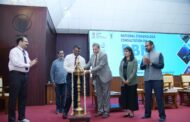Having completed 36 days at sea, the team is still continuing the survey and the collected species will be used for detailed analysis later at the CMFRI laboratory
Kochi: The ICAR-Central Marine Fisheries Research Institute (CMFRI) team has collected valuable samples of various squid species to investigate the cephalopod biodiversity in the Antarctic zone, battling fierce cyclones and treacherous sea. The team is part of the ongoing 12th Indian scientific expedition to the Southern Ocean.
The team involving Dr Geetha Sasikumar, Principal Scientist and Dr K K Sajikumar, Technical Officer at Shellfish Fisheries Division of CMFRI focuses on estimating the relative abundance and distribution of cephalopods, mainly squids, and understanding their role in the Antarctic ecosystems. Having completed 36days at sea, the team is still continuing the survey and the collected species will be used for detailed analysis later at the CMFRI laboratory to find out scientific details on the biodiversity in the Southern Ocean and to determine the squid age by analysing the growth rings in their “ear bones” (statoliths).

“These studies are vital for understanding the distribution and ecological significance of these species in the region, paving the way for their sustainable management”, said Dr Geetha Sasikumar. The CMFRI team is also employing various methods to investigate the distribution and abundance of the flying squids, in the Southern Ocean.
The expedition, organised by the National Centre for Polar and Ocean Research (NCPOR) in Goaunder the Ministry of Earth Sciences, led by Dr Anoop Sharad Mahajan (IITM) and Dr Sabu Prabhakaran (NCPOR), is participated by 16 collaborating research institutes and universities across India and abroad.
The scientific expedition, with 42 researchers is covering 26 pre-fixed locations for sampling along the cruise track. “Sampling in these remote oceanic regions is subject to weather conditions”, Dr Sasikumar said.

Extreme weather conditions
The expedition, scheduled for 47 days, confronted low pressure systems related to three cyclones and extreme windy cold weather conditions with giant waves. The cyclonic conditions on their path forced the vessel at times to navigate through towering waves and preventing them from stopping at certain stations.
“Sampling at low temperatures (-22°C) andnavigating through icebergs and floating sea ice was challenging at times,” Dr Sajikumar of CMFRI said, highlighting the extreme conditions they endured. “The rough sea conditions at the “Roaring Forties and Furious Fifties” made basic necessities difficult, as our primary focus was maintaining balance inside the vessel. We could only endure 2-5 minutes outside the vessel in this condition. Despite these challenges, we could successfully manage to collect samples for the investigation”, he added.

Stunning spectacle
The expedition also provided a stunning spectacle of the vast sea with sighting of diverse marine fauna, including whales, seabirds, penguin and seals in the Southern Ocean. These observations contribute valuable data to ongoing marine biodiversity monitoring efforts in the region, said Dr Geetha Sasikumar. The expedition team is on their return journey to India, but their arrival is dependent on weather conditions.
Media Cell
CMFRI
(Please share your experience, interesting news articles and case studies at aquapostnews@gmail.com)





